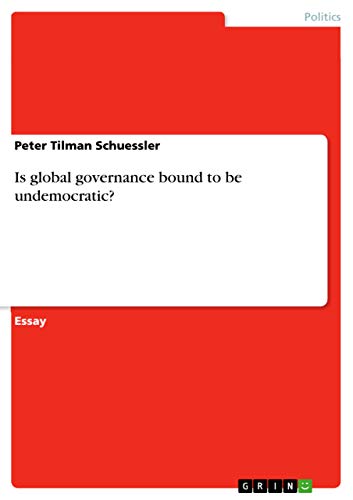Articoli correlati a Is global governance bound to be undemocratic?

Le informazioni nella sezione "Riassunto" possono far riferimento a edizioni diverse di questo titolo.
- EditoreGRIN Verlag
- Data di pubblicazione2012
- ISBN 10 365621283X
- ISBN 13 9783656212836
- RilegaturaCopertina flessibile
- Numero edizione5
- Numero di pagine16
Compra nuovo
Scopri di più su questo articolo
Spese di spedizione:
EUR 23,00
Da: Germania a: U.S.A.
I migliori risultati di ricerca su AbeBooks
Is global governance bound to be undemocratic?
Descrizione libro Taschenbuch. Condizione: Neu. This item is printed on demand - it takes 3-4 days longer - Neuware -Essay from the year 2002 in the subject Politics - International Politics - General and Theories, grade: 17 von 20 (A), University of St Andrews (Department of IR), course: IR 2004, language: English, abstract: The answer to this question seems to be very simple. Global governance is bound to be undemocratic because, according to Dahrendorf, Internationalisation 'almost invariably means a loss of democracy'1. Why and if this is the case will be examined in this essay. Governance, in contrast to government2, 'refers to the process of making collective decisions, [.] in international relations, for example, no world government exists to resolve problems but many issues are resolved by negotiation'3. After a discussion about democracy in this context, the focus will be laid on different global intergovernmental organisations (IGOs), followed by a future outlook over possible future alternative possibilities and restraints. It will be shown that international democratic decision making is not likely to happen.Before entering the discussion, it is necessary to define what the term democracy` refers to. Normally it is used in a national context, and even within this context there exist various forms in parallel in neighbouring nations, whose political styles span from governmental to federal, and from one party to multiple party systems. Regarding the international order, which can be seen as a society of states, definition becomes more difficult. A basic definition is offered by the MSN Encarta as follows: 'A political system in which the people of a country rule through any form of government they choose to establish'4; but this refers merely to the people` and to a permanent institutional idea that does catch the real process. The definition of a 'democratic governmental system [which describes] a system of government based on the principle of majority decision-making'5 might suit here better, although it uses the term government instead of governance. Hence a decision in international terms has to be supported by the majority to be called democratic. Yet it is not clear what kind of majority this could be. Is it the majority of states This implies that each state would have one voice without special rights unlike a veto. However, is this really democratic This would favour small (in size and population), generally powerless and poor states and put large, populous, generally rich and influential countries at a disadvantage. 16 pp. Englisch. Codice articolo 9783656212836
Is global governance bound to be undemocratic?
Descrizione libro Taschenbuch. Condizione: Neu. Druck auf Anfrage Neuware - Printed after ordering - Essay from the year 2002 in the subject Politics - International Politics - General and Theories, grade: 17 von 20 (A), University of St Andrews (Department of IR), course: IR 2004, language: English, abstract: The answer to this question seems to be very simple. Global governance is bound to be undemocratic because, according to Dahrendorf, Internationalisation 'almost invariably means a loss of democracy'1. Why and if this is the case will be examined in this essay. Governance, in contrast to government2, 'refers to the process of making collective decisions, [.] in international relations, for example, no world government exists to resolve problems but many issues are resolved by negotiation'3. After a discussion about democracy in this context, the focus will be laid on different global intergovernmental organisations (IGOs), followed by a future outlook over possible future alternative possibilities and restraints. It will be shown that international democratic decision making is not likely to happen.Before entering the discussion, it is necessary to define what the term democracy` refers to. Normally it is used in a national context, and even within this context there exist various forms in parallel in neighbouring nations, whose political styles span from governmental to federal, and from one party to multiple party systems. Regarding the international order, which can be seen as a society of states, definition becomes more difficult. A basic definition is offered by the MSN Encarta as follows: 'A political system in which the people of a country rule through any form of government they choose to establish'4; but this refers merely to the people` and to a permanent institutional idea that does catch the real process. The definition of a 'democratic governmental system [which describes] a system of government based on the principle of majority decision-making'5 might suit here better, although it uses the term government instead of governance. Hence a decision in international terms has to be supported by the majority to be called democratic. Yet it is not clear what kind of majority this could be. Is it the majority of states This implies that each state would have one voice without special rights unlike a veto. However, is this really democratic This would favour small (in size and population), generally powerless and poor states and put large, populous, generally rich and influential countries at a disadvantage. Codice articolo 9783656212836

